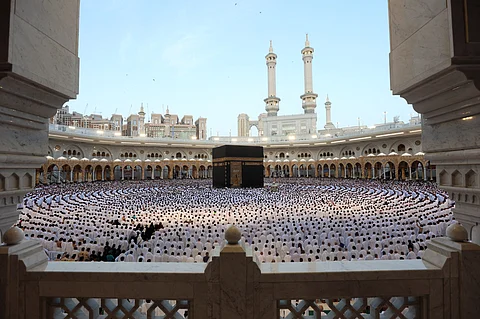
- NEWS
- the EDIT
- COMMENTARY
- BUSINESS
- LIFE
- SHOW
- ACTION
- GLOBAL GOALS
- SNAPS
- DYARYO TIRADA
- MORE

Saudi authorities are preparing to welcome more than a million hajj pilgrims this year amid punishing summer heat in Mecca. To address this, they are using artificial intelligence alongside more shade and misting machines to improve safety and comfort.
Saudi Arabia’s hajj minister Tawfiq al-Rabiah told AFP on Thursday that mitigating the desert heat remains a top priority. "One of the big challenges that we always face is the increasing temperature across the different years and this is an issue that we give top priority," he said during an exclusive interview in Riyadh.
Last year’s pilgrimage saw more than 1,300 pilgrims die as temperatures reached 51.8 degrees Celsius (125.24 degrees Fahrenheit). In response, authorities have mobilized over 40 government agencies and 250,000 officials and doubled their efforts to reduce heat-related risks this year.
Shaded areas have been expanded by 50,000 square meters, thousands more medics will be on hand, and more than 400 cooling units will be deployed. Renovations around the Grand Mosque and special asphalt layers help reduce surface temperatures. "These new changes will definitely ensure the safety and the better experience of pilgrims when they perform their hajj," Rabiah said.
More than a million people from around the world have already arrived in Saudi Arabia, with more still coming. In 2024, 1.8 million pilgrims gathered in Mecca.
The latest artificial intelligence software will help monitor the large amount of information and video footage from a new fleet of drones covering Mecca. "We use advanced AI technologies to do this monitoring and get fast feedback," the minister said.
Crowd management has been difficult in the past, especially in 2015 when a stampede caused about 2,300 deaths.
Along with expanding infrastructure and increasing personnel, Saudi officials have cracked down on pilgrims without the right permits. Authorities say more than 80 percent of deaths last year involved pilgrims who lacked official permits and thus could not access services like air-conditioned tents.
Hajj permits are distributed by quota to countries and allocated by lottery. Many pilgrims still try to enter without permits despite the risks of arrest and deportation. To prevent this, Saudi Arabia has launched raids, a media campaign, and increased fines including possible 10-year bans.
"Therefore, having a permit is very crucial, very important for the safety of all," Rabiah said. "We count on all Muslims to come only with permits and also we count on all countries to support us to ensure that only those with permits come to hajj."
The pilgrimage will begin on June 4 and last at least four days. It is one of the five pillars of Islam and must be undertaken at least once by all Muslims who are able.
Rabiah stressed the importance of the pilgrimage to Saudi leadership and people. "The hajj pilgrimage is a sacred journey that the leadership of the kingdom and the whole people of the kingdom take it seriously," he said. "They see it as a duty to work hard to ensure the spiritual fulfillment and safety of pilgrims."
By combining AI technology with expanded cooling efforts and strict permit enforcement, Saudi Arabia aims to make this year’s Hajj safer and more comfortable despite the extreme heat.
